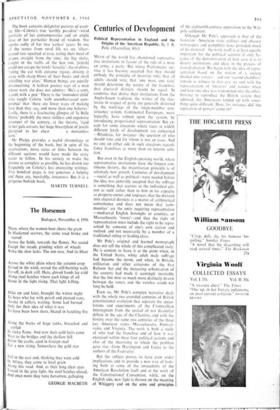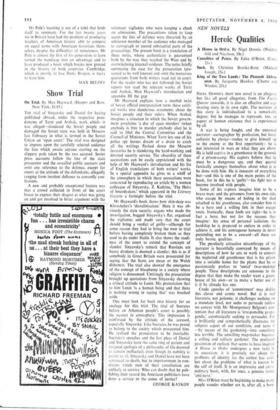Centuries of Development
Muni of the world has abandoned representa- tive institutions in favour of the rule of a man, an army, a party. But where Parliaments sur- vive it has become accepted that they should embody the principle of majority rule; that all adults should vote, that 'one man, one vote' should determine the nature of the franchise, that electoral districts should be equal. In countries that derive their institutions from the Anglo-Saxon tradition, the wishes of the elec- torate in respect of party are generally distorted by the workings of the single-member con- stituency system. Continental Europeans, more logically, have refined upon the system, by introducing proportional representation. But ex- cept for some situations where races at widely different levels of development are concerned — Rhodesia, for instance—the question of who should vote and for whom is not an issue. And no one on either side in such situations regards fancy franchises as more than an interim solu- tion.
But even in the English-speaking world, where representative institutions have the longest con- tinuous history, the majoritarian principle is of relatively new growth. Centuries of development — social as well as political—were needed before the idea was generally accepted that the suffrage is something that accrues to the individual citi- zen as such rather than to him in his capacity as property-owner and taxpayer, that the division into electoral districts is a matter of arithmetical convenience and does not mean that 'com- munities' are the units requiring representation — mediaeval English boroughs or counties, or Massachusetts 'towns'—and that the right of representation must include the right to be repre- sented by someone of one's own station and outlook and not necessarily by a member of a traditional ruling or leading class.
Mr Pole's original and learned monograph does not tell the whole of this complicated story. He is content to leave it at the point when, in the United States, white adult male suffrage had become the norm, and when, in Britain, utilitarian and other criticisms of the first Reform Act and the increasing urbanisation of the country had made it seemingly inevitable that the line now so much more distinctly drawn between the voters and the voteless could not long be held.
Even so, Mr Pole's complex narrative deals with the whole two crowded centuries of British constitutional evolution that separate the specu- lations and experiments of the Cromwellian interregnum from the revival of not di,similar debate in the age of the Chartists, and with the history over the same two centuries of the three key American states—Massachusetts, Pennsyl- vania and Virginia. The work is both a study of who had the franchise and of how it w as exercised within these four political systems and also of the theorising to which the problem gave rise—from Harrington and Locke to the authors of the Federalist.
But the subject proves to have even wider implications and to provide a new way of look- ing both at some of the antecedents of the American Revolution itself and at the work of the Constitutional Convention, while, on the English side, new light is thrown on the meaning of Whiggery and on the aims and principles
of the eighteenth-century opposition to the Wal- pole settlement.
Although Mr Pole's approach is that of the historian--American state archives and obscure newspapers and pamphlets have provided much of his material- - the work itself is at least equally important for the political scientist if only be- cause of the demonstration of how easy it is to distort institutions and ideas in the process of transplantation. We begin with the idea of repre- sentation based on the notion of a society divided into 'estates.- • and our 'second chambers' remain as witness to that era; we end with the representation of 'interests. and wonder when and how one idea was transmuted into the other. Striving to reproduce the British system they admired, the Americans landed up with some- thine, quite different. How, for instance, did 'the separation of powers' come in?
Mr Pole's learning is not of a kind that lends itself to summary. For the last twenty years we in Britain have had the problem of producing teachers of American history able to compete on equal terms with American historians them- selves, despite the difficulties of remoteness. Mr Pole is almost the first of his generation to have turned the handicap into an advantage and to have produced a book which breaks new ground in the history of both countries. Cambridge, which is shortly to lose Denis Brogan, is lucky to have him.
MAX BELOFF



































 Previous page
Previous page